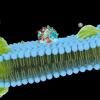With all the talk of hair growth, it's probably time to repost this work from Luna Nanoworks:
Nanomedicine. 2009 Jun;5(2):202-7. doi: 10.1016/j.nano.2008.09.005. Epub 2009 Feb 14.
Fullerene nanomaterials potentiate hair growth.
Zhou Z1, Lenk R, Dellinger A, MacFarland D, Kumar K, Wilson SR, Kepley CL.
1Luna nanoWorks, a division of Luna Innovations Incorporated, Danville, Virginia, USA.
Hair loss is a common symptom resulting from a wide range of disease processes and can lead to stress in affected individuals. The purpose of this study was to examine the effect of fullerene nanomaterials on hair growth. We used shaved mice as well as SKH-1 "bald" mice to determine if fullerene-based compounds could affect hair growth and hair follicle numbers. In shaved mice, fullerenes increase the rate of hair growth as compared with mice receiving vehicle only. In SKH-1 hairless mice fullerene derivatives given topically or subdermally markedly increased hair growth. This was paralleled by a significant increase in the number of hair follicles in fullerene-treated mice as compared with those mice treated with vehicle only. The fullerenes also increased hair growth in human skin sections maintained in culture. These studies have wide-ranging implications for those conditions leading to hair loss, including alopecia, chemotherapy, and reactions to various chemicals.
PMID: 19223242
Perhaps it is the high dosage that I take that allows for enough C60 to make it to my skin as in the subdermal treatment.
I am going to add topical and topical with dermarolling as well as continuing my high dosage regimen
Edit: Fixed Attributions -niner
Edited by niner, 13 December 2014 - 01:35 AM.






















































